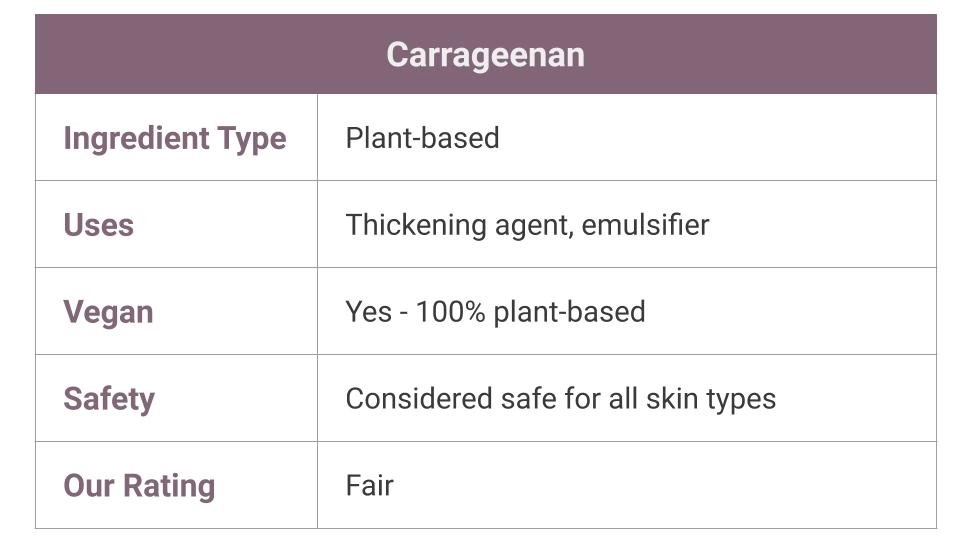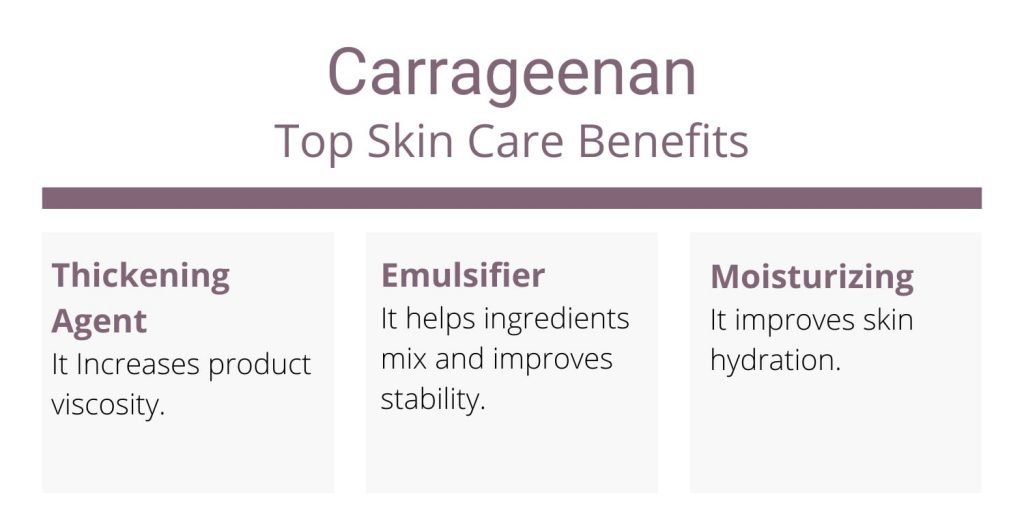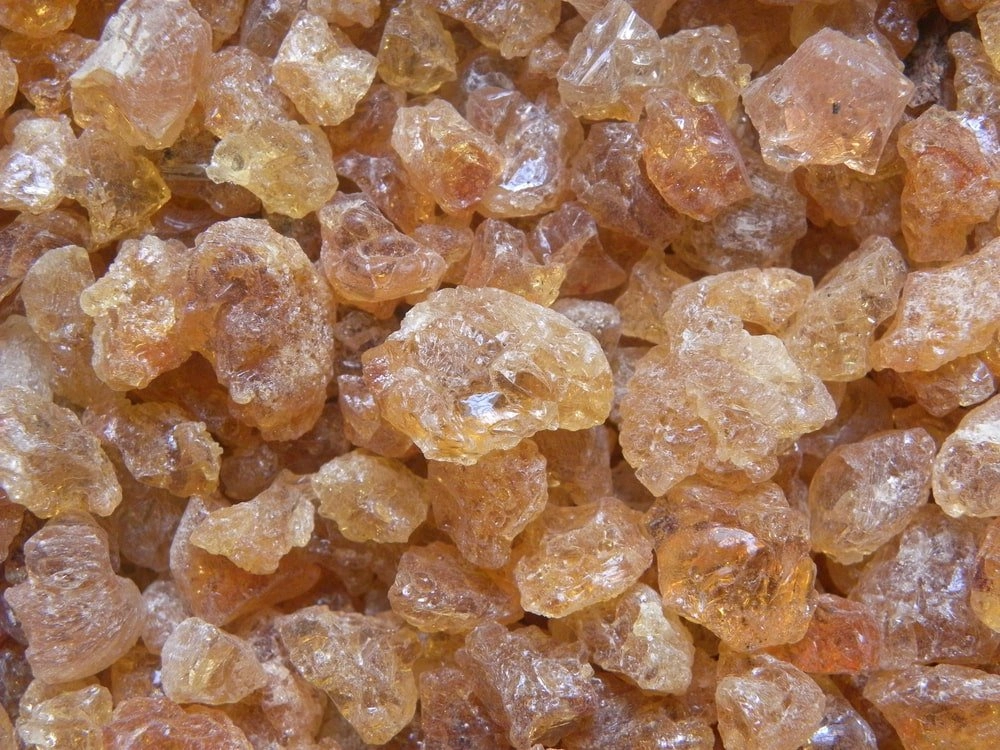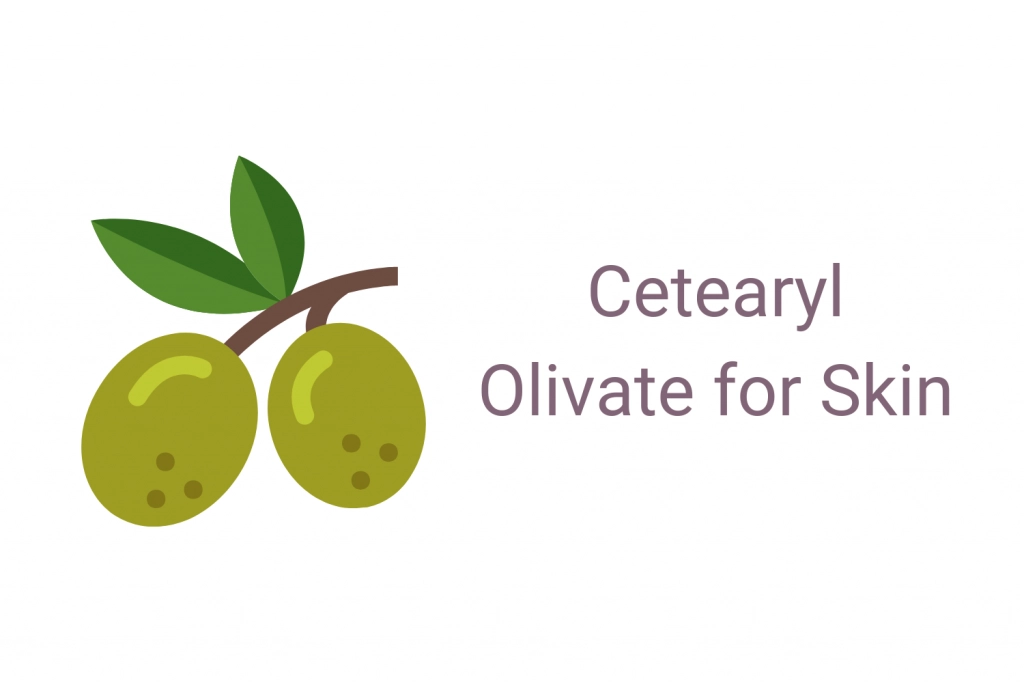Photo above by Tobias Bjørkli from Pexels
This post may contain affiliate links. Read the full disclosure here
Carrageenan is derived from Chondrus crispus, a species of red seaweed commonly called Irish moss. You’ll find this ingredient in skin care products and food. You’ll find carrageenan in foods such as yogurt, salad dressing, pudding, sauces, and ice cream. It’s a thickener and an emulsifier. It helps improve product texture and helps water-based and oil-based ingredients mix better.
These benefits are useful for skincare and cosmetics products too. Carrageenan can help products get a smooth, creamy texture. It isn’t a standalone ingredient that you’ll want to chase after. But it can complement other ingredients and formulations nicely.
Is Carrageenan Bad for Skin?
After reading a few articles about carrageenan or doing a few Google searches, you’ll quickly find the controversy about why this ingredient is bad. You can see our take on that in the “is it safe” section below. Another one of the common criticism about carrageenan and other seaweed ingredients is that they are bad for acne. It’s true, many seaweed-based ingredients have higher comedogenic ratings. This means they have a higher likelihood to clog pores. Clogged pores often lead to pimples.

However, the direct connection to carrageenan and acne hasn’t been proven or disproved. There is validity in the claims that many seaweed-based ingredients have high comedogenic ratings but this isn’t necessarily the case for carrageenan. This ingredient may not be the acne villain that many bloggers and publishers claim it to be. There isn’t sufficient research out there that says it won’t negatively impact acne or clog your pores.
We haven’t found any acne treatment products that are clinically proven that use this ingredient either. Instead, this ingredient is generally used in moisturizing and anti-aging creams. If you personally struggle with acne, this is a good ingredient to keep an eye on. If you aren’t getting the results you’re looking for, try swapping out products that use this ingredient with another. It’s worth a shot! Everyone’s skin is different so it’s possible that this could be one of the ingredients causing some of the trouble.
Carrageenan Benefits for Skin
Carrageenan can help increase the thickness of products so they have a thick, smooth texture that’s easier to apply. If you have ever used a moisturizing night cream then you know the thick, creamy texture we’re talking about. Dripping, watery products just aren’t as fun to use.
Carrageenan also can help improve hair and skin hydration by retaining moisture. This is why you often find this ingredient in moisturizers, shampoos, and conditioners.
Thickening agent
Carrageenan can increase the viscosity for easier and more consistent use. It can help thicken skincare ingredient so they are easier to use as directed.
Emulsifier
This benefit helps ingredients mix better. Oil-based and water-based ingredients naturally don’t mix. That’s where ingredients like carrageenan come in. It can help product formulations mix and remain stable. This can also improve the shelf-life of certain products. Find other examples of emulsifiers we’ve covered such as xanthan gum, algin, and zea mays starch.
Moisturizing
It can help lock-in moisture on the skin to help skin retain hydration. Carrageenan has water-binding properties that help it hold-in moisture.

See our full list of seaweed types and their benefits here.
Is Carrageenan Safe?
There have been concerns about using carrageenan in food products. Most of the concerns refer to “degraded carrageenan” which is a processed form of carrageenan that breaks down the bonds to make the molecules smaller. This process was developed as a way to make carrageenan easier to ingest as part of a medical treatment. It was used to treat peptic ulcers.
However, in the last few decades studies emerged that linked degraded carrageenan to stomach ulcers and tumors in mice. As you would expect, this particular treatment and degraded carrageenan, isn’t used any longer. In the early 2000s, Joanne K. Tobacman, M.D also raised concerns about the use of normal carrageenan in foods since it could be contaminated with degraded carrageenan. She even filed a petition with the FDA pleading to have this ingredient banned. Her findings weren’t enough to convince the FDA so this ingredient is still considered safe to use in food.
To be fair, the studies were based on rats that were consuming between 2.5% and 15% of carrageenan in their diet. Humans are consuming far far less carrageenan in their diet.
What About Its Safety in Skincare and Cosmetics?
So there has been controversy about ingesting this ingredient, what about its use in skincare? We know carrageenan offers thickening, emulsifying, and moisturizing benefits. But is it safe to use?
Like most plant-based ingredients, the research on carrageenan skincare safety is slim. You don’t need to be concerned about the issues raised for consuming carrageenan since the molecule is too large to make it into your bloodstream (when applied topically).
EWG gave this ingredient a 1, which is their lowest (safest) rating based on links to cancer, toxicity, and allergic reactions. Paula’s Choice considers this a “good” ingredient in their ingredient dictionary, and the Cosmetic Ingredient Review considers this ingredient safe to use as directed.
The major outfits in the space consider this ingredient to be safe and it enhances product texture and has moisturizing benefits. Based on everything we’ve found, using skincare products with carrageenan shouldn’t cause you any trouble. Carrageenan allergic reactions or sensitivities weren’t noted in the research we found but we did find a few examples of people who are allergic to carrageenan.
It’s a good reminder to point out. If you haven’t used a product with carrageenan or other seaweeds, it’s worth testing on a small patch of skin to see if you have a reaction. Keep an eye out for this ingredient and other seaweed-based ingredients such as algin, corallina officinalis extract, laminaria digitata extract, enteromorpha compressa extract, palmaria palmata extract, and spirulina.





